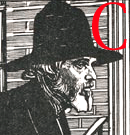 arlyle coined the term 'dismal science' for Political Economy, or
economics on the grounds of their alleged failings in his pamphlet, 'An Occasional discourse on the Negro Question', first published in 1849; another edition appeared in London in 1851 entitled 'An Occasional discourse on the Nigger Question' — surely an outrageous and disgraceful indicator of the nature of Carlyle's argument, which far from merely poking fun at economists, actually exhibits a deep racist slant on the subject.
arlyle coined the term 'dismal science' for Political Economy, or
economics on the grounds of their alleged failings in his pamphlet, 'An Occasional discourse on the Negro Question', first published in 1849; another edition appeared in London in 1851 entitled 'An Occasional discourse on the Nigger Question' — surely an outrageous and disgraceful indicator of the nature of Carlyle's argument, which far from merely poking fun at economists, actually exhibits a deep racist slant on the subject.
The conventional belief, repeated as an assertion until it came to be accepted without question, is that economics is a 'dismal science' because Carlyle, speaking for all of us, reacted to the pessimism of Thomas Malthus and the dry as dust analysis of David Riccardo (which many economists find difficult to read as Ricardo was not accessible even to members of the profession). In other words, the statement about the 'dismal science' was plausible and Carlyle was only pointing this out. The fact is he barely mentioned Malthus or Ricardo in all his writings and shows no evidence of assessing either man's Works in this manner).
The truth is different. Carlyle called 'economics the dismal science' not because of its pessimism but because he objected to its humanitarian optimism Carlyle did not in fact direct his remarks at Ricardo or Malthus, or even at Adam Smith. He was writing a rebuttal of ideas expressed by John Stewart Mill, whose Principles of Political Economy was published in 1848. Mill had advanced the notion that all peoples on Earth, from all races and colours, were basically the same. Blackmen and women were not born to slavery; they were forced into it. Carlyle absolutely disagreed with Mill's humanistic notion. He expresses in his pamphlet the most offensive justification of slavery, denied explicitly that Africans were of the same species at Europeans (the very idea incensed Carlyle — as it did his friends and colleagues, among whom we find John Ruskin and Charles Dickens), and he lambasted J. S. Mill, an economist and former close friend for claiming the contrary view.
It was the notion that people are equal as human beings that Carlyle found as evidence that economics was the 'dismal science'. This had nothing to do with Malthus, or Riccardo, or Smith (who explicitly agreed (1776) with the humanistic notion, later elaborated by Mill in 1848). Adam Smith's vision of the human condition combined moral sentiments and the advance of democracy, the rule of law and justice with his great hopes that commerce and agriculture would gradually rid the world of poverty and injustice. Most economists, let alone the general public, do not know of Smith's broader humanistic and optimistic vision. They have dumped this part of Smith's legacy for 'homo economicus', which was never part of his legacy. They have used Smith's name to justify the most appalling breaches of human behaviour. Hence, if economics was truly the 'dismal science' asserted by the popular misconception from an entirely different attack on economics by Thomas Carlyle then I would not draw attention to the misconception.
To suggest that the disgraceful origins of the notion of economics as a 'dismal science' had anything to with the contents of economics (the popular misconception), when what Carlyle was criticising was to the lasting credit of Smith and Mill, is a canard that should be corrected and not passed on in a web site addressing educational topics to young people.
[In 2005 the author suggested that readers “can find a scholarly account on this episode in Robert Dixon’s “The Origins of the term 'Dismal Science,’” which formerly appeared on a University of Melbourne site but which is no longer at the same URL. As the author suggested, “simply go to Google and enter 'dismal science.’” — George P. Landow]
Last modified 11 September 2015